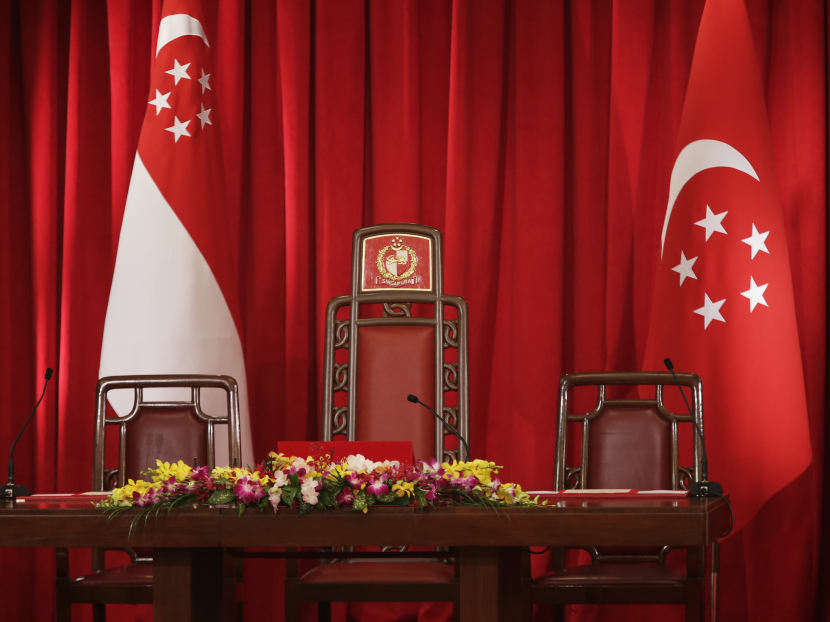Changes to Elected Presidency passed after 3 days of intense debate
SINGAPORE — Changes to the Elected Presidency (EP) were passed into law on Wednesday (Nov 9), tightening the criteria for aspirants to the highest office and putting in place a mechanism to ensure Singapore has a minority President from time to time.
SINGAPORE — Changes to the Elected Presidency (EP) were passed into law on Wednesday (Nov 9), tightening the criteria for aspirants to the highest office and putting in place a mechanism to ensure Singapore has a minority President from time to time.
After three days of debate involving 39 Members of Parliament (MPs) — including Prime Minister Lee Hsien Loong and five ministers — the Constitution amendment Bill was voted through 77-6, with all six elected MPs from the opposition Workers’ Party (WP) objecting. Non-constituency and Nominated MPs were among those who had weighed in, but they cannot vote on such Bills.
Presidential Elections will now be reserved for a particular race that has not seen an elected representative for five consecutive terms — starting with the one due in August for the Malay community. The bar has also been raised for those from the private sector seeking to contest, to a new cut-off of helming a company with at least S$500 million in shareholders’ equity, while the Council of Presidential Advisers will have strengthened powers.
During the debate, the stricter criteria, including reservations about a focus on financial acumen and how big the pool of qualified minority candidates would be, were issues MPs raised. On the part of the WP, its proposal to scrap the EP and vest custodial responsibilities in an eight-member elected Senate attracted scrutiny by several from the ruling People’s Action Party.
In his wrap-up speech on Wednesday, Deputy Prime Minister Teo Chee Hean — borrowing the words of Mr Lee in Parliament on Tuesday — acknowledged that there was no perfect solution in updating the EP scheme.
But the changes proposed represent an improvement to the current system, he said. “What we are trying to do is to find the best way of doing so,” Mr Teo told the House.
The proposed changes were recommended by an independent Constitutional Commission appointed by Mr Lee in January this year, said Mr Teo, who stressed that the nine-member body had carried out a “non-partisan, inclusive, transparent, open and comprehensive” review before tabling their suggestions.
“The PM decided to set up an independent commission because he did not want the review to end up being embroiled in a to-ing and fro-ing, as we have seen in the last few days,” said Mr Teo, who contrasted it to how the WP had sprang an alternative that was not thought through.
“We wanted an objective look at the issue, so that we can have the most comprehensive report, and to do it openly and transparently.”
Addressing concerns about the emphasis on financial acumen among potential candidates — raised by Mr Christopher de Souza, Mr Zaqy Mohamad and Ms Kuik Shiao-Yin — Mr Teo stressed that aspirants must have the knowledge and competence to make decisions on financial matters of “significant magnitude or scale, as well as on key appointments”.
While he agreed with sentiments that intangible qualities such as integrity and character are crucial, these are difficult to legislate, said Mr Teo.
“It is our people who will ultimately have to be the judge of whether a candidate has what it takes — especially where these important intangibles are concerned — to be the President when our people exercise their vote,” he added. And rather than reserve elections for women candidates, Mr Teo said qualified individuals should be identified, supported and encouraged to run for office.
MP Yee Chia Hsing also asked if the hiatus of five terms, or 30 years, is too long for a reserved election to kick in. Mr Teo responded that the commission believed this duration struck the right balance between ensuring minority representation without being overly prescriptive.
Mr Teo noted that some of the best speeches during the debate revolved around the issue of race. While Minister-in-charge of Muslim Affairs Yaacob Ibrahim spoke on the first day on the long-held desire by his community to see one of its own become President, NMP Chia Yong Yong, fighting back tears on Wednesday, talked about not being able to appreciate minorities’ difficulties while growing up.
Voicing similar concerns, NMP Kok Heng Leun said: “The fact that we need to amend the EP to ensure minority representation says a lot about how far away the majority is from real engagement with minorities. By real engagement, I’m not talking about superficial engagements such as eating thosai or mee rebus, or wearing other races’ costumes.”
Mr Teo also took time to lay into the WP for the “cavalier manner” in which it had put forward its Senate proposal. Noting that the WP had turned down the Constitutional Commission’s invitation to make oral representations in a series of public hearings, he criticised the opposition party — long opposed to the EP — for springing its proposal before the House.
This was done in a “non-transparent, non-consultative way, literally keeping things close to their chest, and asked this House to consider it”, he added.
Mr Teo also asked WP MP Faisal Manap point-blank if his party supported the reserved election for the Malay community next year.
In response, Mr Faisal said: “The very purpose of having a reserved Presidential Election is to address the perception and feelings of minorities ... (which) can also be settled by ... having an appointed Presidency through a rotational system.”
Posing the question a second time, only to receive the same response from Mr Manap, Mr Teo said: “Sometimes silence speaks louder than words.”







